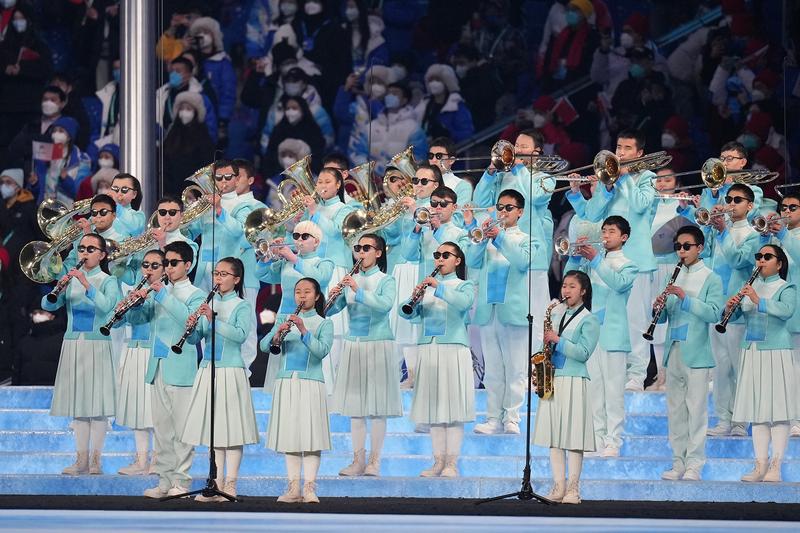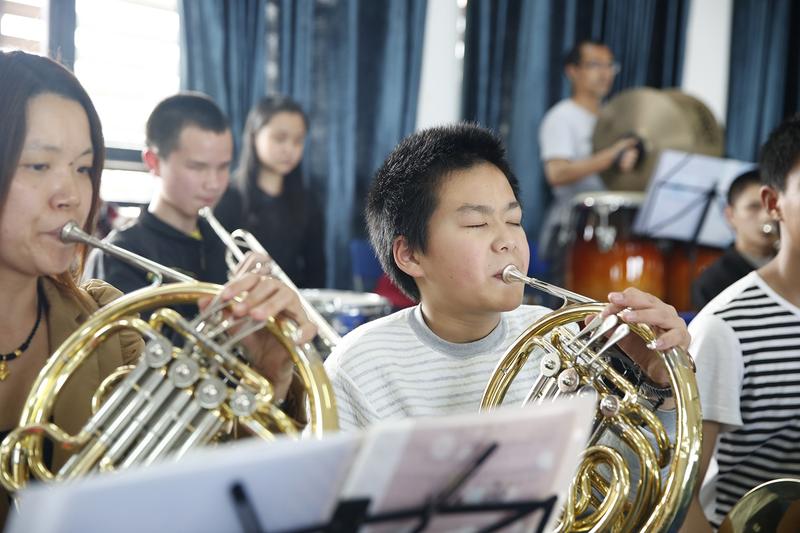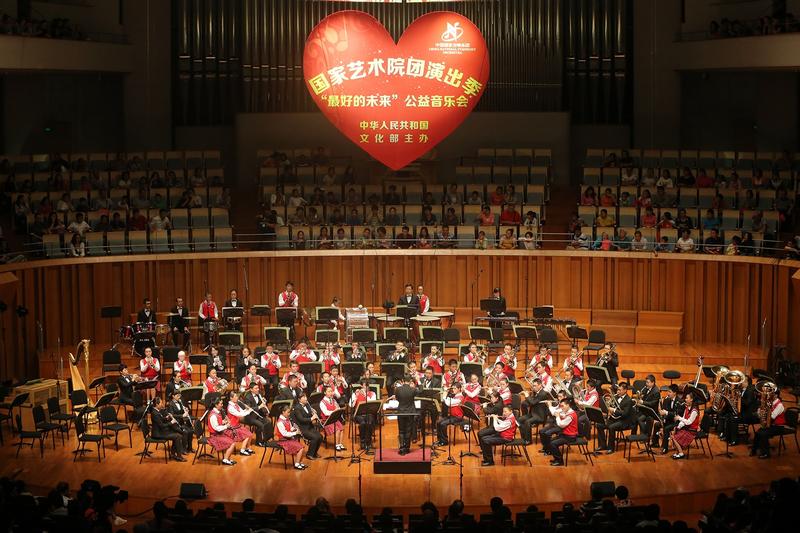Ensemble defies the odds with emotional display and receives widespread acclaim after Paralympic performance, Cheng Yuezhu reports.
 Members of the Yangfan Wind Ensemble from Chongqing perform at the opening ceremony of the Beijing 2022 Winter Paralympics on March 4. (WU ZHUANG / XINHUA)
Members of the Yangfan Wind Ensemble from Chongqing perform at the opening ceremony of the Beijing 2022 Winter Paralympics on March 4. (WU ZHUANG / XINHUA)
It was a piece of music that seemed to sum up the moment. Not just the bravery of the participants at the upcoming event, but the courage and determination of those actually playing the musical instruments. At the opening ceremony of the Beijing 2022 Winter Paralympics on March 4 at the National Stadium, the Yangfan Wind Ensemble from Chongqing performed Anthem of the Future, the official Paralympic anthem. It was both a solemn and inspirational moment.
At first sight, the ensemble could hardly be called professional, comprising mainly teenagers and without a conductor. However, it did take the ensemble 11 years of hard work to emerge from the Chongqing Special Education Center-a school that provides compulsory and vocational education to young people with visual impairments-and perform in the international spotlight.
The pressure was there, but participating in the opening ceremony made me more proud than stressed.
Cai Xiaoxue, 17, a clarinet player in the ensemble
The group, appearing at the opening ceremony, consisted of 44 students, the youngest aged 10 and the oldest 22, two teachers with visual impairment, and a conductor who played percussion in the performance.
Zhou Yuanqi, a teacher of Chinese at the school since 2004, recalls that the establishment of the ensemble can be traced back to December 2010, when the teachers and students went to a New Year's concert.
On the bus back to school, the students were all excitedly humming the tunes or discussing the sounds of the different instruments. Seeing the students' enthusiasm, headmaster of the school, Li Longmei, thought to establish a wind ensemble.
"Our school had had a solid background in music education, but it was limited to folk instruments such as bamboo flute and hulusi (the gourd flute), and the children played mainly solo," Zhou says. "Through that concert, the headmaster found that the children were very curious about Western instruments as well, and wanted to upgrade our music courses."
 They attend a music course and rehearse every Tuesday and Friday. (PHOTO PROVIDED TO CHINA DAILY)
They attend a music course and rehearse every Tuesday and Friday. (PHOTO PROVIDED TO CHINA DAILY)
Another key reason for setting up an ensemble, Zhou says, is that, from her observation, students with visual impairment tended to isolate themselves and work independently. Consequently, the school believed that establishing an ensemble would give them more opportunities to work as a team and enhance their sense of cooperation and achievement.
I can see that having performed at the opening ceremony, the confidence of the children has greatly improved.
Zhou Yuanqi, a teacher at Chongqing Special Education Center
The ensemble was formally established in February 2011, the beginning of the school term. However, difficulties soon revealed themselves, as the external music teachers had no experience in teaching students with visual impairment.
The school then called for their teachers, whose disciplines range from Chinese and math to computers and PE, to join the ensemble, learn the instruments from scratch and then rehearse together with the students.
Zhou also joined the ensemble as a trumpet player. She initially wanted to study the flute, but the seats were limited with the teachers actively responding to the call. Eventually, the ensemble recruited 34 teachers and 36 students.
For two hours every Tuesday and Friday, all of the members of the ensemble attended the music course and rehearsal together.
"At first, we acted as a bridge between the professional music teachers and the children. We had to learn the embouchure, the breath and so on, and then teach the students one-on-one. We also had to sing the music score for the students," Zhou says, explaining the teachers' roles in the ensemble.
With each new piece, the conductor would print out the sheet music for different instruments and parts. The teachers then learn the music and sing to the students, phrase by phrase, for them to memorize.
It was particularly difficult for the teachers with no background in music, who had trouble reading sheet music. They had to translate the scores into numbered musical notation first. They are also required to specify to the students the tempo, dynamics and articulation, and convey to the students the conductor's gestures.
Usually, it takes two weeks for the students to memorize a new piece, but for the opening ceremony performance, due to the limited time for preparation, the teachers spent two days learning the score, and the students took just three days to memorize their individual parts.
 The ensemble performs with China National Symphony Orchestra at a charity concert in Beijing in 2015. (PHOTO PROVIDED TO CHINA DAILY)
The ensemble performs with China National Symphony Orchestra at a charity concert in Beijing in 2015. (PHOTO PROVIDED TO CHINA DAILY)
The official music score, after a composer arranged the original anthem for the ensemble, was distributed to the musicians in mid-January, and members of the ensemble immediately started intensive training instead of going home for the winter vacation.
The youngest of the ensemble, among now more than 70 student members, is 10-year-old Wu Haoyu, who plays the bass drum. His method of practicing drumming is by setting up a metronome with the correct speed, and committing the tempo to memory.
"I'm also learning to play the piano, but unlike practicing piano where I'm alone, playing the bass drum is like being the assistant conductor in the ensemble. I have to concentrate on the rhythm. After the training, I felt that my rhythm became much steadier," Haoyu says.
Haoyu is among the few day students at the school, so this experience was his first time leaving home for such a long time. Before leaving for Beijing, his parents had him cramming to master basic skills to take care of himself, such as washing clothes.
Though he missed his parents terribly, the help and care given by older performers and teachers warmed his heart, Haoyu says.
According to Zhou, the ensemble is a team of solidarity. On campus, it's common to see a student with impaired vision walking alongside two or three students that lack it totally. And at the rehearsals in Beijing, the ensemble usually walked in neat formation, with members placing their hands on the shoulders of those in front of them.
Another member Cai Xiaoxue, a 17-year-old clarinet player, also says that members with low vision often helped her and other sightless students.
For her, the biggest difficulty of the opening ceremony performance came from the outdoor environment, something which she was not accustomed to, as the group mostly perform in auditoriums.
"The open-air stadium is so big and spacious. The notes we played didn't even get reflected back, so sometimes we had trouble hearing both our own instrument and the music played by our fellow performers," Cai says.
The low temperature was also an issue, as Beijing nights, at the time, often fell to below zero. To get used to the environment, the teachers took the students to rehearse outdoors every day, beginning with 10 minutes and gradually extending it to 30-minute sessions.
"I think the anthem is exceptionally beautiful, and it has a sense of solemnity to it. The timbres of woodwind instruments are able to offset those of the brass instruments harmoniously," Cai says.
"The pressure was there, but participating in the opening ceremony made me more proud than stressed."
The ensemble has opened up new career opportunities for the students, with examples of previous members studying music performance at university, and current members, such as Haoyu, with an ambition to become a professional musician, but the ensemble is not about cultivating professionals.
"What's important is to allow the children to learn teamwork, acquire a hobby and skill, and build a confident and optimistic mindset. These will influence them greatly, no matter what profession they enter," Zhou says.
"I can see that having performed at the opening ceremony, the confidence of the children has greatly improved. I believe that, in the future, whatever obstacles they might encounter, they will be able to cope with them," she adds.
Contact the writer at chengyuezhu@chinadaily.com.cn


